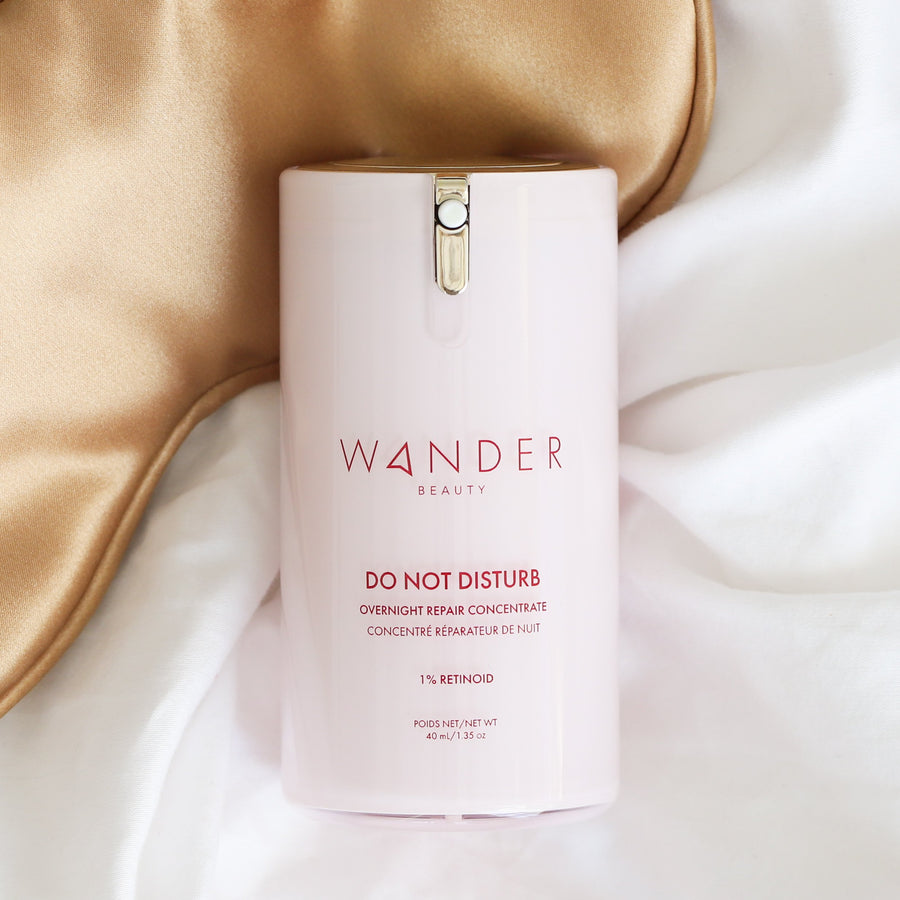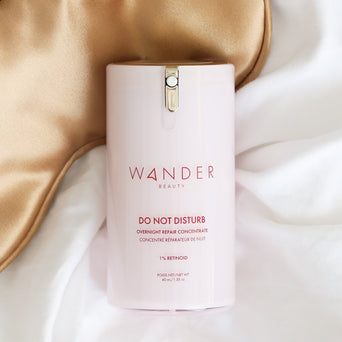Retinoids vs. Retinols: Is There Really a Difference? Here's Everything You Need To Know
By Emily Chiang | Aug 19, 2019
Hallelujah! The secret to nearly perfect skin is out. If you aren’t already familiar with the power of retinoids, they’re about to become your new best friend. This magic in a bottle is an ingredient that many do not know about or fully understand. Curious on how this ingredient could change your skincare routine? Read on for a breakdown of what a retinoid is, what retinol is, what they do and how.
Are Retinoids and Retinols The Same?
Yes and no. This is like asking if an Oreo the same thing as a cookie: An Oreo is a cookie, but a very specific type of cookie. Now that we’re all thinking about delicious sweets, let’s get into how this correlation ties into our skincare. A retinol is a type of retinoid, but a less intense version. If you use a retinol product in your routine, you will still see similar effects, but they’ll take a little longer to achieve. Retinol’s effects take time and undergo different conversions in order to become a retinoid, which naturally leaves it is much weaker than a traditional retinoid.
What Will Retinoids and Retinols Do For My Skin?
Both retinoid and retinol are extractions of vitamin A, and they work wonders at helping prevent acne, minimizing the appearance of wrinkles, and healing sunspots while also smoothing out skin’s texture. Sounds almost too good to be true, huh? Luckily for everyone, it really is true!
This all works by the product penetrating the skin, helping to thicken the underlying layer of skin which helps tighten and firm it. While the product is penetrating deep into your skin to help diminish fine lines and wrinkles, it speeds up the process of turning over any dead skin cells that may be lingering on the surface of your skin. This will assist in preventing any dead skin cells from clogging your pores and therefore minimizing the amount of oil your skin produces.
Is a Retinoid or Retinol Product Best for My Skin?
So although they do sound very similar, we now know that their potency is what makes them different. The next question you may be struggling to figure out is which product is best for your skin type. As mentioned earlier, a retinoid is considered to be a stronger version of retinol and although it will lead your skin to look brand new, it does have some slight side effects. For example, because your skin is undergoing a transformation, it is totally normal to have it get worse before it gets better. Some side effects of a strong retinoid including redness, tingling, and peeling when dealing with a traditional retinoid. These effects have always been one of the downsides of using a retinoid (beauty is pain, right?!), which is why we created Do Not Disturb Overnight Concentrate. While this formula has 1% retinoid, it’s balanced by squalane for extreme hydration, making this formula much more gentle than the typical retinoid. Do Not Disturb also contains dragons blood, which soothes and firms skin, as well as allantoin, which works to heal your skin. By using this formula at night, you’re tapping into your skin’s natural renewal process to maximize your time between the sheets.<product>1</product>
That being said, you may experience a few hiccups as you begin to use a retinoid as your skin adapts to this potent ingredient. In an interview, Dr. Alexiades-Armenakas states “that anyone looking to lessen the appearance of wrinkles should expect to notice a difference in about a month.” It takes time for your skin to absorb and adjust to a new product, so although this ingredient is a powerful one, it still takes time and consistency to work its magic!
If you struggle with sunspots, acne, and fine lines, a retinoid is likely to be a great addition to your routine. If you’re looking to gently enhance your skin and help imperfections you may have, an over the counter retinol cream may be for you. While a retinol won’t work nearly as strong or fast as a retinoid, it may be a good starting point for some.
What Products Should I Avoid When Using a Retinoid or Retinol?
Although it is safe and encouraged to carry out your typical skincare routine, there are some products that are a big no no’s when using a retinol/retinoid. These include products and ingredients such as toners, exfoliators and benzoyl peroxide. These three ingredients all have something in common: They either dry out or leave it exposed. Using a retinoid or retinol increases your skin’s photosensitivity, so you want to be sure to protect it in between.
Exfoliators are something to avoid due to the fact that after exfoliating your skin, you have removed any dead skin leaving your skin vulnerable to the sun. Retinoids are fabulous when used on their own, but when combined with an exfoliant can put your skin at risk to the sun's harmful rays, which could lead to more damage - which is what you’re trying to counteract! It is important to skip the exfoliating whenever you are using a retinoid or vise-versa.
It is also important to steer clear of anything that may dry out the skin, such as acne treatments or toners. Using these combined with a retinoid can lead to over-drying of your skin and peeling. Sticking to a great retinoid is all you need to maintain clear skin and a gorgeous complexion!
Have you ever used a retinoid? Did we convince you to add one to your routine? Shop Do Not Disturb Overnight Repair Concentrate here.
Retinoids vs. Retinols: Is There Really a Difference? Here's Everything You Need To Know

Hallelujah! The secret to nearly perfect skin is out. If you aren’t already familiar with the power of retinoids, they’re about to become your new best friend. This magic in a bottle is an ingredient that many do not know about or fully understand. Curious on how this ingredient could change your skincare routine? Read on for a breakdown of what a retinoid is, what retinol is, what they do and how.
Are Retinoids and Retinols The Same?
Yes and no. This is like asking if an Oreo the same thing as a cookie: An Oreo is a cookie, but a very specific type of cookie. Now that we’re all thinking about delicious sweets, let’s get into how this correlation ties into our skincare. A retinol is a type of retinoid, but a less intense version. If you use a retinol product in your routine, you will still see similar effects, but they’ll take a little longer to achieve. Retinol’s effects take time and undergo different conversions in order to become a retinoid, which naturally leaves it is much weaker than a traditional retinoid.
What Will Retinoids and Retinols Do For My Skin?
Both retinoid and retinol are extractions of vitamin A, and they work wonders at helping prevent acne, minimizing the appearance of wrinkles, and healing sunspots while also smoothing out skin’s texture. Sounds almost too good to be true, huh? Luckily for everyone, it really is true!
This all works by the product penetrating the skin, helping to thicken the underlying layer of skin which helps tighten and firm it. While the product is penetrating deep into your skin to help diminish fine lines and wrinkles, it speeds up the process of turning over any dead skin cells that may be lingering on the surface of your skin. This will assist in preventing any dead skin cells from clogging your pores and therefore minimizing the amount of oil your skin produces.
Is a Retinoid or Retinol Product Best for My Skin?
So although they do sound very similar, we now know that their potency is what makes them different. The next question you may be struggling to figure out is which product is best for your skin type. As mentioned earlier, a retinoid is considered to be a stronger version of retinol and although it will lead your skin to look brand new, it does have some slight side effects. For example, because your skin is undergoing a transformation, it is totally normal to have it get worse before it gets better. Some side effects of a strong retinoid including redness, tingling, and peeling when dealing with a traditional retinoid. These effects have always been one of the downsides of using a retinoid (beauty is pain, right?!), which is why we created Do Not Disturb Overnight Concentrate. While this formula has 1% retinoid, it’s balanced by squalane for extreme hydration, making this formula much more gentle than the typical retinoid. Do Not Disturb also contains dragons blood, which soothes and firms skin, as well as allantoin, which works to heal your skin. By using this formula at night, you’re tapping into your skin’s natural renewal process to maximize your time between the sheets.<product>1</product>
That being said, you may experience a few hiccups as you begin to use a retinoid as your skin adapts to this potent ingredient. In an interview, Dr. Alexiades-Armenakas states “that anyone looking to lessen the appearance of wrinkles should expect to notice a difference in about a month.” It takes time for your skin to absorb and adjust to a new product, so although this ingredient is a powerful one, it still takes time and consistency to work its magic!
If you struggle with sunspots, acne, and fine lines, a retinoid is likely to be a great addition to your routine. If you’re looking to gently enhance your skin and help imperfections you may have, an over the counter retinol cream may be for you. While a retinol won’t work nearly as strong or fast as a retinoid, it may be a good starting point for some.
What Products Should I Avoid When Using a Retinoid or Retinol?
Although it is safe and encouraged to carry out your typical skincare routine, there are some products that are a big no no’s when using a retinol/retinoid. These include products and ingredients such as toners, exfoliators and benzoyl peroxide. These three ingredients all have something in common: They either dry out or leave it exposed. Using a retinoid or retinol increases your skin’s photosensitivity, so you want to be sure to protect it in between.
Exfoliators are something to avoid due to the fact that after exfoliating your skin, you have removed any dead skin leaving your skin vulnerable to the sun. Retinoids are fabulous when used on their own, but when combined with an exfoliant can put your skin at risk to the sun's harmful rays, which could lead to more damage - which is what you’re trying to counteract! It is important to skip the exfoliating whenever you are using a retinoid or vise-versa.
It is also important to steer clear of anything that may dry out the skin, such as acne treatments or toners. Using these combined with a retinoid can lead to over-drying of your skin and peeling. Sticking to a great retinoid is all you need to maintain clear skin and a gorgeous complexion!
Have you ever used a retinoid? Did we convince you to add one to your routine? Shop Do Not Disturb Overnight Repair Concentrate here.


